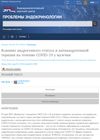Inhibition of SARS-CoV-2 Entry Through the ACE2/TMPRSS2 Pathway: A Promising Approach for Uncovering Early COVID-19 Drug Therapies
July 2020
in “
European Journal of Clinical Pharmacology
”

TLDR Blocking the virus's entry into cells by targeting certain pathways could lead to early COVID-19 treatments.
The review from July 21, 2020, highlighted the potential of using pharmacological interventions to inhibit the entry of SARS-CoV-2 into host cells by targeting the ACE2 and TMPRSS2 pathways, which are critical for viral entry. It identified several existing drugs and drug classes that could serve as potential treatments, including recombinant soluble ACE2, ACE2 modulators, TMPRSS2 inhibitors (camostat mesylate, nafamostat mesylate, antiandrogens, inhaled corticosteroids), and ADAM-17 enhancers. The review suggested that these drugs, which are already clinically used for other conditions, could be repurposed for prophylactic and therapeutic interventions in the early stages of COVID-19. It emphasized the urgency of further investigation into these agents through preclinical models and clinical studies. Additionally, the document mentioned the role of androgens in influencing susceptibility to severe COVID-19 and the ongoing clinical trials for drugs like camostat mesylate and nafamostat mesylate, which have shown promise in inhibiting viral entry.






